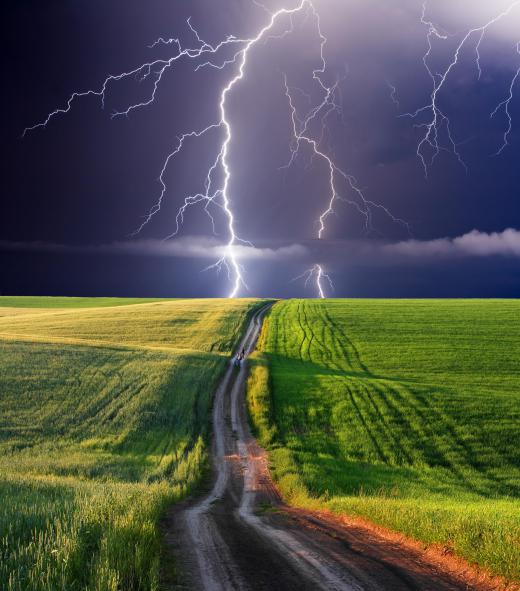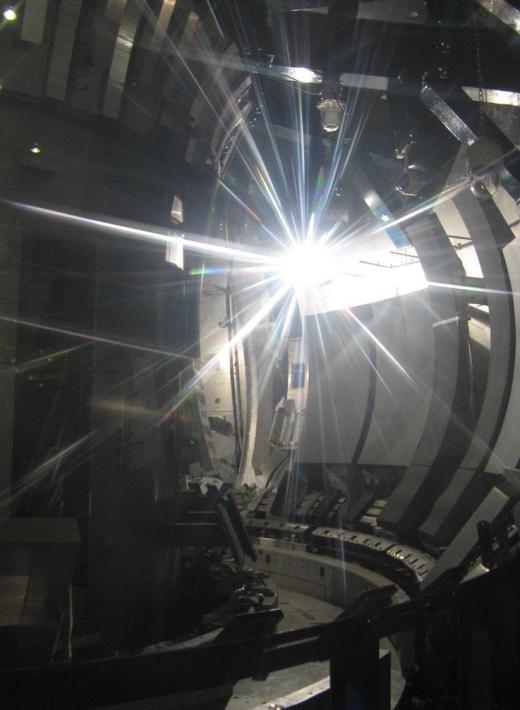What is Plasma?
 Michael Anissimov
Michael Anissimov
Plasma is a phase of matter distinct from solids, liquids, and gases. It is the most abundant phase of matter in the universe; both stars and interstellar dust consist of it. Although it is its own phase of matter, it is often referred to as an ionized gas. This is similar to a normal gas, except that electrons have been stripped from their respective nucleons and float freely within the material. Even if only 1% of the atoms have lost their electrons, a gas will display plasma-like behavior.
Electrically conductive and able be manipulated by magnetic fields, plasma can be found in a variety of everyday contexts, including televisions, fluorescent lamps, neon signs, photolithographic etching machines, flames, lightning, the aurora borealis, tesla coils, and more.

Plasmas vary widely. Some parameters used for their classification are the degree of ionization, temperature, density of the magnetic field, and particle density. For example, the gas in a candle flame is only very slightly ionized, whereas the air in the path of a lightning bolt is highly ionized. Some forms are very low temperature, like the intergalactic medium, while others are very high temperature, like the center of a star.

Unlike gases, which are composed of neutral atoms, charged plasmas have distinct constituents that behave on their own accord. Free electrons are negatively charged, while the nuclei, lacking electrons, are positively charged ions. Most plasmas still contain whole atoms that are electrically neutral as well. Since each of these components can behave differently in response to changes in external and internal conditions, a variety of complex wave-like phenomena can emerge.

Plasma phenomena can be observed safely in the home with the use of a plasma ball. This device runs an electric field through a charged gas contained within a glass globe. When a person touches the edge of the globe, the ionized gas responds by sending out visible filaments to the person's finger, demonstrating the tendency of an electric charge to "ground" itself. Complex, fractal patterns can be seen within the ball.

Because plasma can be contained by magnetic fields, it can be made very hot without diffusing the heat into a surrounding medium. Ones measuring millions of degrees Kelvin have been produced in special devices called tokamak reactors. In the not-too-distant future, people may regularly use superheated plasmas to initiate nuclear fusion reactions that produce large amounts of power.
AS FEATURED ON:
AS FEATURED ON:















Discussion Comments
Is plasma in the environment?
plasma is used in a great variety of applications. read carefully "It can be found in a variety of everyday contexts, including plasma displays, fluorescent lamps, neon signs, plasma balls, photolithographic etching machines, flames, lightning, aurora borealis, tesla coils, and more." Microelectronic chips are made by the use of plasma etching.
in addition, plasma is going to be used in the reactor of nuclear fusion that is currently being built.
Lightning is plasma. more precisely, it's an example of "glow discharge at atmospheric pressure". however, it's not only glow discharge. it's more complex, and, unfortunately, electron energy distribution function can't be estimated accurately for lightning occurring in nature.
what is the difference between a plasma electric fire and a normal one. (considering buying a wall mounted electric fire.)
please give an example of plasma which is used in daily life.
I don't understand! Is lightning plasma?
What are the long term affects of gamma globulin treatments?
It is a fact that plasmonics will play great role in the green energy market economy by integrating with the existing PN junction solar cell by making it more absorbent of heat in all ranges of the frequency that come from the sunlight.
But the biggest question that leads people to discussion is the impact of the farming progress to this world because there is more radiation on the globe. This may have some effect on the health of the people.
sounds to me that plasma is much the same as electricity only in a a gaseous form, like charged particles of electrons, only in this case it is sub molecules of charged particles in a gaseous state, which will automatically search for a ground. this is very interesting and may lead to information on the display of the northern lights. i would suppose friction remains the constant where heat is involved.
I want a different meaning for plasma.
Is plasma chemically reactive? How is the thermal and electrical conductivity of plasma state compared to gaseous?
How can plasma be used?
How exactly is plasma formed?
Is lightning a source of plasma?
Can you freeze plasma?
What is the process in a plasma ball?
Post your comments